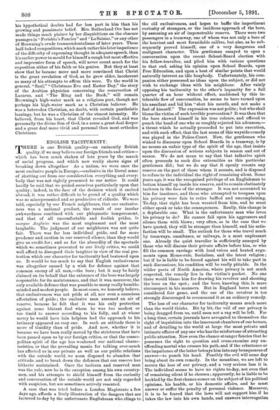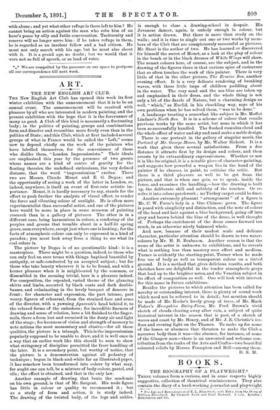ENGLISH TACITURNITY.
THERE is one British quality—an eminently British quality, if we may believe our foreign friends and critics— which has been much shaken of late years by the march of social progress, and which now really shows signs of breaking down altogether As a nation, we were once the most exclusive people in Europe,—exclusive in the literal sense of shutting out from our consideration everything and every- body that was not rightly presented to our notice. It could hardly be said that we prided ourselves particularly upon that quality ; indeed, in the face of the derision which it excited abroad, it was rather difficult to be proud of a quality which was so misrepresented and so productive of ridicule. We were told, especially by our French neighbours, that our exclusive- ness was a national product, the result of onr insular awkwardness combined with our phlegmatic temperament, and that of all uncomfortable and foolish prides, la morgue Anglaise was the most unpleasant and the most laughable. The judgment of our neighbours was not quite fair. There was far less individual pride, and far more prudence and caution in our reserved silence, than they would give us credit for; and as for the absurdity of the spectacle which we sometimes presented to our lively critics, we could well afford to disregard their laughter in view of the real pro- tection which our character for taciturnity had bestowed upon us. It would be too much to say that English exclusiveness was altogether caused by a wish for defence against that common enemy of all men,—the bore ; but it may be fairly claimed on its behalf that the existence of the bore was largely responsible for its maintenance, and that it was, moreover, the only available defence that was possible to many really humble- minded and modest people. In most cases, we honestly believe, that exclusiveness was not pride at all, nor even a conscious affectation of pride ; the exclusive man assumed an air of reserve, because he felt that it was his only protection against some blatant fool whom he was too modest or too timid to answer according to his folly, and at whose mercy he would have lain helpless had the approach to his intimacy appeared an easy one. In such an attitude there is more of timidity than of pride. And now, whether it is because we have been really moved by the strictures that have been passed upon us by our foreign critics, or that the cosmo- politan spirit of the age has weakened our national charac- teristics, or that the prevailing mania for talking over-much has affected us in our private as well as our public relations with the outside world, we seem disposed to abandon that attitude, and to break down the defences that our reserve has
hitherto maintained. Once the taciturn and reserved man was the rule, now he is the exception among his own country- men, and his attempts to shield himself from the curiosity and conversation of the outside world are not only regarded with suspicion, but are sometimes actively resented.
A case that was tried before a London Magistrate a few days ago, affords a lively illustration of the dangers that are incurred to-day by the unfortunate Englishman who clings to
the old exclusiveness, and hopes to baffle the impertinent curiosity of strangers, or the insidious approach of the bore, by assuming an air of impenetrable reserve. There were two passengers in a tramway, one of whom was not only a bore of the heaviest and most formidable calibre, but also, as he sub- sequently proved himself, one of a very dangerous and malignant character. This gentleman essayed to open a conversation upon the recent School-Board election with his fellow-traveller, and plied him with various questions to that end, asking his opinion upon School Boards, upon Free Education, and upon a host of similar points that would naturally interest an idle busybody. Unfortunately, his com- panion either possessed no ideas upon the subject, or did not wish to exchange ideas with his neighbour. After vainly opposing his taciturnity to the other's loquacity for a full quarter of an hour without effect, maddened by this in- tolerable flow of conversation, he seems to have turned upon his assailant and bid him " shut his month, and not make a fool of himself." The expression was not polite ; but who shall blame the victim of such terrible provocation ? It was then that the bore showed himself in his true colours, and offered to punch the head of one who so roughly rejected his advances,— a threat which he actually proceeded to put into execution, and with such effect, that the last scene of this wayside comedy was played in the Police-Court. Now, the gentleman who wished to discourse upon School Boards in a tramway, is by no means an unfair type of the spirit of the age, that insists upon the discussion of serious subjects in season and oat of season. We do not mean to say that that talkative spirit often proceeds to such dire extremities as this particular gentleman did ; but we do say that it openly resents any reserve on the part of those whom it accosts, and is disposed to refuse to the individual the right of remaining silent. Some years ago, it was the recognised privilege of an Englishman to button himself up inside his reserve, and to remain obstinately taciturn in the face of the stranger. It was not accounted to him for insolence, and those who attempted to trespass upon his privacy were fain to retire baffled and uncomplaining. To-day, that right has been wrested from him, and he must either speak or take the consequences. Really, this change is a deplorable one. What is the unfortunate man who loves his privacy to do? He cannot fall upon his aggressors and silence them with blows ; very often, as in the case that we have quoted, they will be stronger than himself, and his satis- faction will be small. The outlook for those who travel much by tramways, omnibuses, or railways, is a most unpleasant one. Already the quiet traveller is sufficiently annoyed by those who will discuss their private affairs before him, or who fill the common carriage with loud voices and heated argu- ments upon Home-rule, Socialism, and the latest religion ; but if he is liable to be forced against his will to take part in such discussions, his condition will be really pitiable. In the wilder parts of North America, where privacy is not much respected, the remedy lies in the victim's pocket. No one there would blame him for drawing his revolver and shooting the bore on the spot ; and the bore, knowing this, is more circumspect in his manners. But in England bores are not considered fair game, and the use of the revolver is too strongly discouraged to recommend it as an ordinary remedy.
The loss of our character for taciturnity means much more than the world thinks. Bit by bit, the veil of our privacy is being dragged from us, until soon not a rag will be left. For a long time, certain journals have arrogated to themselves the right of inquisition into the innermost chambers of our houses, and of detailing to the world at large the most private and intimate affairs of any one who has the misfortune of attracting public attention. Now even the chance stranger fancies that he possesses the right to question and cross-examine any un- offending mortal who crosses his path, and if the reluctance or the impatience of the latter betrays him into any brusqueness of answer—to punch his head. Possibly the evil will some day bring about its own remedy. In the meantime, we are left to mourn the loss of our privacy, and a very serious loss it is. The individual seems to have no rights to-day, not even that of remaining silent if he chooses ; apparently, he is liable to be heckled by the first chance-comer on the subject of his political opinions, his health, or his domestic affairs, and he must answer or suffer the penalty of personal violence. Moreover, it is to be feared that the laws will not support him if he takes the law into his own hands, and answers interrogation
with abuse ; and yet what other refuge is there left to him ? He cannot bring an action against the man who robs him of an hour's peace by silly and futile conversation. Taciturnity and reserve will no longer serve him : if he takes refuge in them, he is regarded as an insolent fellow and a bad citizen. He must not only march with his age, but he must also shout with it. It is a grand age, no doubt ; but we would that it were not so full of speech, or so loud of voice.



















































 Previous page
Previous page